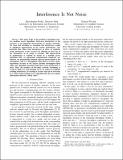Interference is not noise
Author(s)
Bodas, Shreeshankar; Shah, Devavrat; Wischik, Damon
DownloadShah_Interference is not noise.pdf (185.5Kb)
OPEN_ACCESS_POLICY
Open Access Policy
Creative Commons Attribution-Noncommercial-Share Alike
Terms of use
Metadata
Show full item recordAbstract
This paper looks at the problem of designing wireless medium access algorithms. Inter-user interference at the receivers is an important characteristic of wireless networks. We show that decoding (or canceling) this interference results in significant improvement in the system performance over protocols that either treat interference as noise, or explicitly avoid interference at the receivers by allowing at most one of the transmitters in its range to transmit. This improvement in performance is realized by means of a medium access algorithm with: (a) polynomial computational complexity per timeslot, (b) polynomially bounded expected queue-length at the transmitters, and (c) a throughput region that is at least a polylogarithmic fraction of the largest possible throughput-region under any algorithm operating using that treats interference as noise. Thus, the hardness of low-delay network scheduling (a result by Shah, Tse and Tsitsiklis [1]) is an artifact of explicitly avoiding interference, or treating it as noise and can be overcome by a rather simple medium access algorithm that does not require information theoretic "block codes".
Date issued
2012-01Department
Massachusetts Institute of Technology. Department of Electrical Engineering and Computer Science; Massachusetts Institute of Technology. Laboratory for Information and Decision SystemsJournal
49th Annual Allerton Conference on Communication, Control, and Computing 2011 (Allerton)
Publisher
Institute of Electrical and Electronics Engineers (IEEE)
Citation
Bodas, Shreeshankar, Devavrat Shah, and Damon Wischik. “Interference Is Not Noise.” 49th Annual Allerton Conference on Communication, Control, and Computing 2011 (Allerton). 119–126.
Version: Author's final manuscript
ISBN
978-1-4577-1817-5